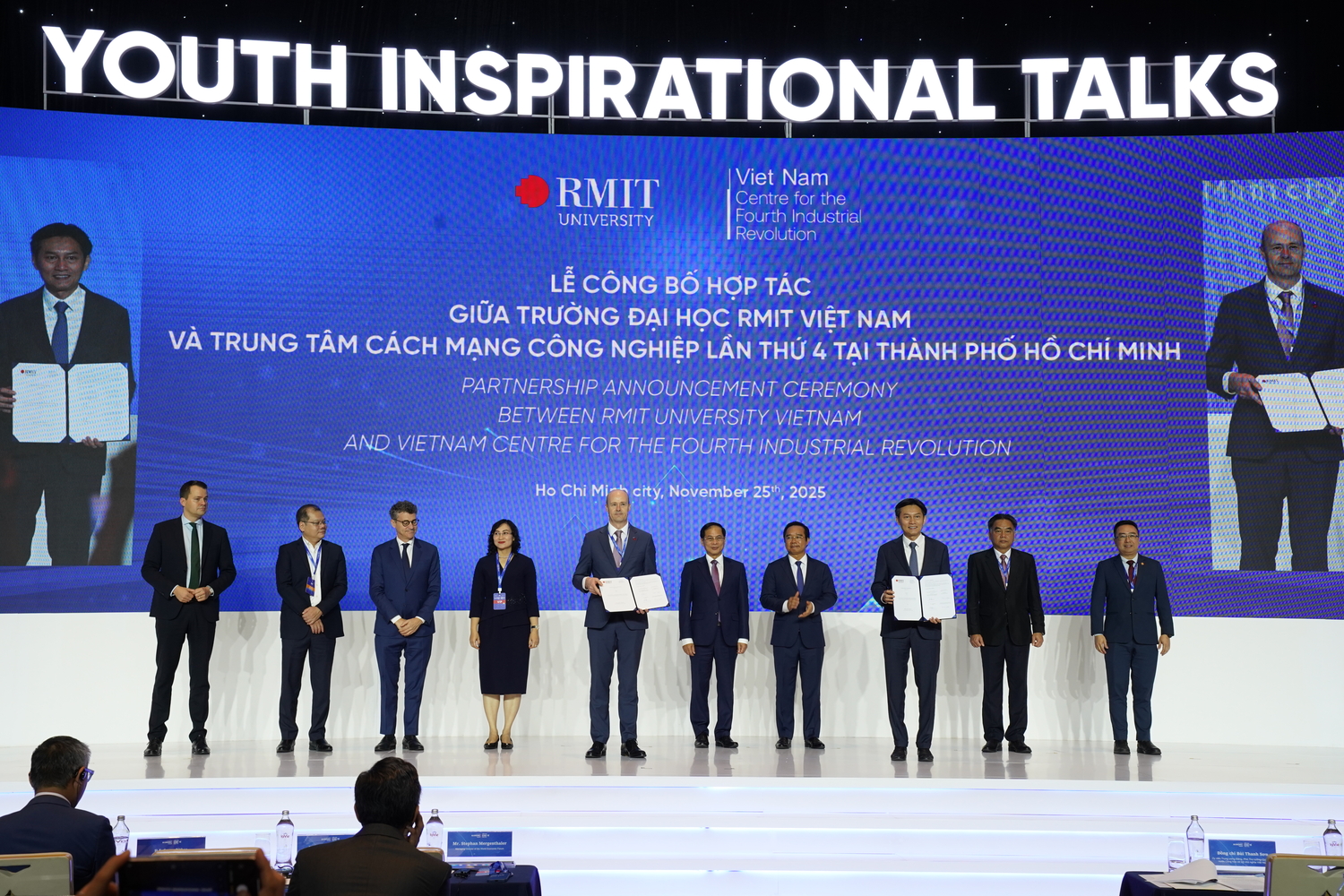Youth Inspiration Talks, with the theme “Intelligent Generation NOW,” was held on November 25 as part of the Autumn Economic Forum 2025 hosted by Ho Chi Minh City, emphasizing the role of Vietnam’s young people in shaping a smart and sustainable future.
The event brought together 500 representatives from universities, startups, youth-led enterprises, and research institutions to engage in dialogue with international organizations such as the World Economic Forum (WEF), UNESCO, and the UN, aiming to bridge gaps and find solutions for Vietnam.
This year, the program provided space for dialogue, idea exchanges, and collective action under the question: “What will this generation do to shape the future?”
Leaders’ expectations for the next generation
Speaking on behalf of the government, Deputy Prime Minister Bui Thanh Son highlighted that Vietnam is standing at the threshold of a breakthrough in the era of AI, green transformation, and digitalization. The country’s greatest advantage lies in its population of over 100 million people, particularly intelligent, creative, and ambitious youngsters.
To achieve the goals of making Vietnam an upper-middle-income country by 2030 and a high-income country by 2045, the government is implementing historic policies, including strategies for science and technology, innovation, and digital transformation. “Among all these priority development policies, young people - the future owners of the country - are always placed at the center, carrying our immense trust and high expectations,” the Deputy Prime Minister said.
He reaffirmed Vietnam’s longstanding commitment to nurturing young talent. He called on young Vietnamese to embrace entrepreneurship not only for personal growth but also for national development, with confidence that the next generation will help deliver a “green, peaceful, and prosperous Vietnam” in the digital age.
Chairman of the Ho Chi Minh City People's Committee Nguyen Van Duoc described today’s youth as the Intelligent Generation NOW, growing up in a digital environment, equipped with open-minded thinking, advanced technological skills, and a bold, action-oriented spirit. The city places high expectations on this generation to serve as core partners in building a modern, civilized, and globally-integrated urban center, he said.
“I firmly believe that the Intelligent Generation NOW will continue the traditions of previous generations and draw global attention to Vietnam’s intelligence, resilience, and creativity,” Mr. Duoc noted, adding that “The city is committed to creating the most favorable conditions to fully unlock and nurture the potential of our young people.”
From an international standpoint, Mr. Stephan Mergenthaler, Managing Director of the WEF, shared insights into global trends in the digital era and advised young Vietnamese to prepare for the future of work. The WEF’s Future of Jobs report indicated that while human-driven tasks currently account for 47 per cent of corporate duties, by 2030, 39 per cent of core skills will change, requiring capabilities that many workers have not yet encountered. Mr. Mergenthaler emphasized that technology will not replace humans but will define skills that are uniquely human, such as creativity, resilience, curiosity, and lifelong learning. Collaboration between humans and machines is therefore critical, and 62 per cent of companies are seeking employees who can work effectively with AI.
From UNESCO’s perspective, Mr. Jonathan Wallace Baker, Chief Representative in Vietnam, stressed that young people are not merely adapting to technological shifts - they are becoming key shapers of the future economy and emerging technologies.
Young voices take center stage
During the “Voice of the NOW” session, six young Vietnamese representatives engaged directly with WEF and UNESCO leaders. Ms. Le Nguyen Bao Ngoc, Founder of Gen Zero, raised concerns about digital inclusion for vulnerable groups and questioned how multi-stakeholder partnerships across the UN system, government, private sector, and youth networks can ensure equitable access to AI opportunities.

Mr. Mergenthaler stressed that digital inclusion must be a central pillar of Vietnam’s digital transformation, encompassing both technical infrastructure and “soft infrastructure” such as digital skills and literacy. Women, people with disabilities, and other marginalized groups must be embedded into national digital public infrastructure strategies from the outset.
On collaboration models, he recommended that institutions “meet young people where they are,” leveraging youth-led digital platforms and creative channels. Networks such as Global Shapers were highlighted as key bridges connecting communities, policymakers and international organizations.
UN representatives reinforced that inclusivity remains a core mandate of UN, UNESCO, and WEF initiatives, and that youth networks play an essential role in bringing emerging voices to global dialogues.
Responding to questions about over-reliance on AI and technology-driven FOMO (fear of missing out) at businesses, Mr. Mergenthaler reiterated that “AI is a tool to enhance thinking, not replace it.” The real value is in identifying the right problems and combining human judgment with machine intelligence, an area where young people have a natural advantage due to their adaptability and openness.
Connecting universities, industry and government for the next generation
The gathering also witnessed the signing of an MoU between RMIT University Vietnam and the Ho Chi Minh City Center for the Fourth Industrial Revolution (C4IR HCMC), opening long-term collaboration in smart city development and R&D.
Speaking with VnEconomy / Vietnam Economic Times, Professor Scott Thompson-Whiteside, Pro Vice-Chancellor and General Director of RMIT University Vietnam, affirmed that the event served as a vital platform to engage with and foster dialogue between Ho Chi Minh City and global partners, experts, and key stakeholders.

He emphasized that the MoU lays the foundation for a strategic partnership combining the strengths of a global university with those of a leading policy and innovation institution. “Our shared goal is to support Ho Chi Minh City’s ambition to become a regional hub of smart, inclusive, and sustainable growth,” he noted.
The partnership will leverage RMIT’s academic expertise, research capability, post-graduate talent, and global network to deliver practical solutions aligned with the city’s development priorities. By linking policy formulation, technology application, and education, the collaboration aims to strengthen high-quality human resources for Vietnam’s future.
RMIT is also partnering with C4IR HCMC in the “Youth Inspiration Talks”, an initiative designed to inspire young Vietnamese to play an active role in building a smart and green future.
On the practical contributions of the partnership, Professor Thompson-Whiteside highlighted that the MoU establishes a framework for cooperation across areas essential to Ho Chi Minh City’s innovation roadmap: smart urban development, talent development, applied sustainability research, and emerging technologies.
“In coordination with C4IR HCMC, we plan to develop initiatives that enhance the city’s innovation environment, from collaborative research programs and policy pilots to training activities that equip young professionals with future-ready skills,” he said.
The two sides will also explore co-organizing international conferences and expert dialogues, bringing global perspectives and actionable insights to Vietnam. These activities support the city’s digital transformation by facilitating knowledge exchange, encouraging technology adoption and fostering stronger cooperation between government, academia, and industry.
Discussing how the partnership will help strengthen links across the innovation ecosystem, Professor Thompson-Whiteside emphasized that RMIT’s mission has always been to connect education with industry and societal needs.
Under the MoU, RMIT aims to deepen collaboration between universities, businesses, startups, government agencies and innovation centers through joint applied research projects, industry-engaged learning programs, sponsored PhD opportunities, and the development of environments that support experimentation, innovation, and technology commercialization.
“These initiatives help bridge academic knowledge with real-world applications, accelerate the adoption of Industry 4.0 technologies, and contribute directly to Ho Chi Minh City’s long-term development goals,” he affirmed.









 Google translate
Google translate